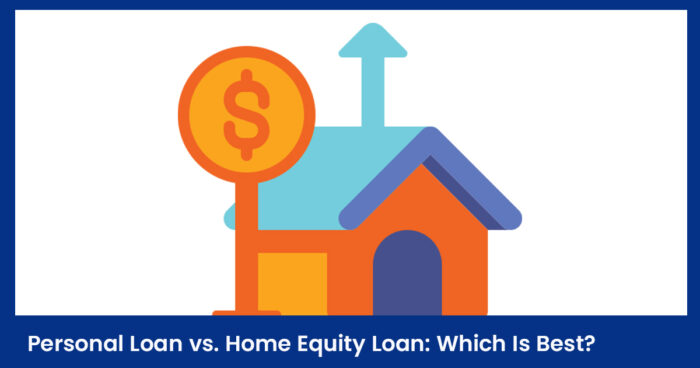Personal Loan vs. Home Equity Loan: Which Is Best? Both home equity loans and personal loans can help you cover big expenses like medical bills, home renovations, debt consolidation, or major purchases. They are both fixed financing options, meaning you borrow a set amount and pay it back in equal monthly installments over a period of time.

Each option comes with its own advantages. The better choice for you will depend on your financial situation. Below, we explain what each loan offers and how to decide which one is right for you.
What is a Personal Loan?
A personal loan is an unsecured loan, which means you don’t need to provide any collateral. You can use it for many things, such as paying for a wedding, covering medical costs, consolidating debts, or financing a large purchase like a car.
Loan terms usually range from one to seven years, and interest rates often fall between 4 and 36 percent. You can borrow from a few hundred to as much as one hundred thousand dollars, depending on the lender. Your income, credit score, and existing debt all influence how much you can borrow and what your interest rate will be.
How Personal Loan vs. Home Equity Loan works:
Once you apply, approval could take minutes or up to a week. Most lenders look for a credit score of at least 660. If you are approved, the money is deposited into your bank account, often within a few days. You start paying back the loan shortly after. You’ll pay interest on the full amount, whether or not you use all of it. Some lenders may also charge additional fees for starting or paying off the loan early.
When to Consider a Personal Loan:
Choose this if you only need to borrow a smaller amount, want a fast and easy application, and don’t own a home or have home equity. It may also be a better fit if you have good credit and want a shorter repayment timeline. Just remember that personal loans usually come with higher interest rates than home equity loans.
What is a Home Equity Loan?
A home equity loan is a secured loan that uses the value of your home as collateral. You can usually borrow up to 85 percent of your home’s value, minus what you still owe on your mortgage.
These loans tend to have lower interest rates than personal loans because they are backed by your home. But that also means if you can’t repay the loan, the lender could take your home.
How it works:
The application process can take a few weeks, as the lender will need to evaluate your home’s value. Once approved, the loan is paid out in one lump sum. You’ll begin repayment in monthly installments with a fixed interest rate.
When to Consider a Home Equity Loan:
This option is best if you need to borrow a larger amount, have built up enough equity in your home, and can qualify for a lower interest rate. It is also a good choice if you are using the money for home improvements, since the interest you pay might be tax deductible.
Comparing the Pros and Cons
When deciding between different loan options, it’s important to weigh the pros and cons of each. This helps you understand how each choice fits your financial goals, lifestyle, and budget. In this section, we’ll take a closer look at the advantages and drawbacks of personal loans and home equity loans to help you make a well-informed decision.
Personal Loan Pros
- Quick approval and funding
- No risk of losing your home
- No need for collateral
Cons
- Higher interest rates for those with low credit scores
- May include fees for early repayment
- Shorter terms can lead to higher monthly payments
Home Equity Loan Pros:
- Lower interest rates than personal loans
- Longer repayment periods
- Possible tax benefits if used for home renovations
Cons
- Risk of losing your home if you fail to repay
- High closing costs
- Longer approval process
- Loan amounts may exceed what you need
Final Thoughts
The right loan depends on your needs and financial situation. If you want quick access to a smaller amount of money without risking your property, a personal loan may be the better choice. If you need a larger amount, have home equity, and want lower interest rates, a home equity loan could be more suitable.
You may also want to explore other options like credit cards, home equity lines of credit, 401(k) loans, or cash-out refinancing, depending on what fits best for your plans.



